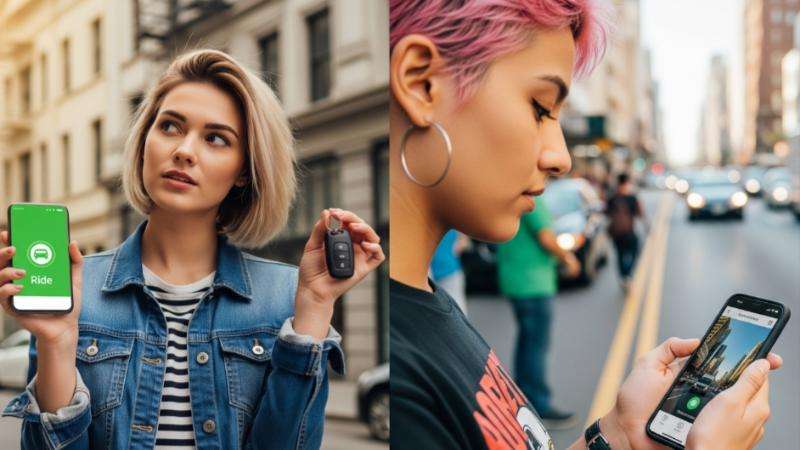A profound cultural and economic shift is reshaping personal transport habits among young people across the globe, with ride-hailing giants like Uber playing a pivotal role, Daily Dazzling Dawn understands. Despite a surge in domestic car production in the United States and enduring cultural significance in the UK, an increasing number of young adults, particularly those in Generation Z, are opting out of traditional car ownership and even delaying or foregoing driving tests. This evolving landscape signals a new norm: "No Licence Even at 18."
Uber CEO Dara Khosrowshahi recently offered a candid insight into this phenomenon during an episode of The Verge's Decoder podcast. He revealed that even his own teenage son, despite being over 18, has not yet secured a driver's licence. "I'm still trying to get my son his driver's licence, but Uber freed him up," Khosrowshahi stated, highlighting the app's pervasive influence. He further noted the significant decline in the percentage of 16 or 18-year-olds obtaining their licences, estimating a drop from what "used to be two-thirds" to now "probably in the 50 per cent range," underscoring its direct impact on car ownership.
This anecdote mirrors a stark national pattern across the United States. In 2023, only 33% of Americans aged 19 or younger held a licence, a notable decrease from 45% in 2003. Data from 2019 to 2021 further illustrates this trend: the number of 16- to 24-year-olds with driver's licences plummeted from around 60% in 2019 to just 39.5% by 2021. Khosrowshahi attributes Uber's sheer convenience as a key accelerator in this broad departure from conventional car culture.
The trend is equally palpable in the UK. Data indicates a strong decline in interest among young people, including 18-year-olds, in passing their driving test and owning cars. The number of young people aged 16-25 holding a full driving licence in Britain reached record lows in recent years. For instance, in March 2021, only 2.97 million people in this age group held a full licence, a significant drop from 3.42 million in November 2012. While 17-year-olds still show the highest pass rates, there's a noticeable drop for 18-year-olds, suggesting that delaying the test might present more challenges. The overall trend since the early 1990s reflects a consistent decrease in licence-holding among young adults, despite a slight temporary reversal between 2016-2019 for 17-24 year olds.
Several interconnected factors are driving this profound shift. Foremost among them is the escalating financial burden associated with car ownership. The cost of driving lessons, soaring insurance premiums—which can be more than four times higher for 18-20 year olds compared to 66-70 year olds—expensive maintenance, and the price of purchasing a vehicle itself are significant deterrents. A 2019 DfT survey in the UK revealed that 41% of 17-20 year olds cited the expense of driving lessons as a major barrier. A Fox Business report further supports that younger generations are increasingly wary of these financial commitments.
Beyond cost, the sheer convenience and accessibility of ride-hailing apps like Uber and improved public transport networks are undeniable draws. These services offer "freedom without the fuss," providing mobility without the financial responsibilities of ownership, maintenance, insurance, and parking. For a "digital-first" Generation Z that values flexibility, simplicity, and sustainability, car ownership is no longer the sole marker of independence or a top priority. This cultural shift aligns perfectly with the "sharing economy" mindset fostered by apps like Uber, particularly in urban areas where public transport is robust and ride-hailing readily available.
Environmental concerns also play a part, with many younger individuals preferring more eco-friendly transport options or viewing shared mobility as a means to reduce their carbon footprint. The COVID-19 pandemic also created a backlog in driving tests and added financial pressure, contributing to delays in licence acquisition. While the desire for car ownership might still exist among some young people, as suggested by Auto Trader's analysis indicating 90% of 17-24s in the UK view it as vital, the practical barriers to entry are becoming increasingly insurmountable for many.
Recognizing this seismic shift, Uber has strategically positioned itself to cater directly to Gen Z. In 2023, the company launched "Uber for Teens," enabling 13–17-year-olds to book rides and order meals under parental oversight, complete with robust safety features like live tracking and PIN verification. Concurrently, "Uber One for Students" was introduced as a budget-friendly membership, offering perks like free delivery and ride discounts. The campaign's humorous advertising, featuring actor Brian Cox, was designed to resonate with a generation that values personality in its brand interactions.
Uber's success with Gen Z is not just about affordability; it's about aligning with a broader cultural moment. Generation Z is characterized by financial caution, a digital-native mindset, and a reluctance towards long-term commitments like car ownership. As Statista data shows, car ownership is significantly less important to Gen Z than to older generations. Uber has leveraged this understanding to brand itself as more than just a transport app; it's an integral part of a lifestyle that prioritizes freedom, simplicity, and sustainability.
Ultimately, the future of personal transport is less about who owns the road, and more about who drives the future of mobility. For now, it appears Uber is firmly in the driver's seat.








.svg)


